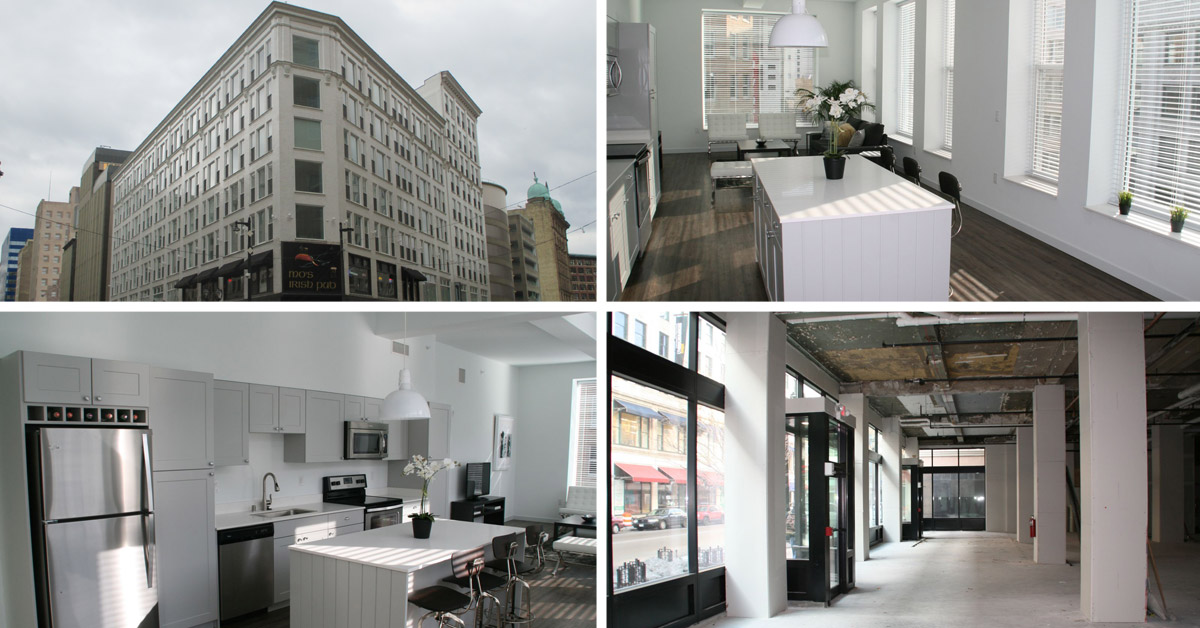Walker Veto Decimates Historic Preservation
Veto will make real estate development harder in Milwaukee and other cities.

MKE Lofts. The redevelopment of the Posner Building was supported by an award of over $4 million in historic preservation tax credits
With the stroke of a pen Governor Scott Walker might have taken a wrecking ball to a number of historic buildings in Milwaukee and across the state.
A partial veto by the governor of a budget provision regarding the state’s Historic Preservation Tax Credit program removes a 0 from the per-project cap figure, reducing the per project state credit cap from $5 million to $500,000. The move is a direct hit on Milwaukee and many other historic main streets across the state.
Since 2014 when the state expanded the credit amount from five percent to 20 percent, the state has awarded $96,187,670 in credits to projects in the city of Milwaukee. Those projects, a handful of which have yet to move forward, have an estimated investment amount of $477,454,576. Statewide the program has awarded $177 million in credits for an estimated investment of $892 million.
When the governor calls it “one of this state’s most expensive economic development incentives” he’s ignoring that it’s one of the state’s most successful. The lost revenue from the tax credits is offset by the massive investment in historic main streets across Wisconsin, including new jobs, new businesses and the restoration of blighted or aging properties. Since the program was expanded long vacant or under-utilized properties have become hotels, breweries, revamped office buildings and modern commercial storefronts. It’s reinvigorated Milwaukee neighborhoods like The Brewery and Walker’s Point and revitalized historic main streets in places like Green Bay and La Crosse.
Take for instance the Button Block building on the northeast corner of N. Water St. and E. Clybourn St. The upper floors of the building sat vacant for over twenty years while the first floor housed a Joey Bouna’s restaurant. With the increased state preservation tax credit, coupled with a 20 percent federal credit, restoration of the building became viable. Bear Development purchased the building and by the end of the year the seven-story building will house a Homewood Suites hotel. More jobs, more tax revenue for every level of government and a restored iconic structure.
Wisconsin Economic Development Corporation records indicate that project has an estimated cost of $20 million and was awarded $3 million from the state. Should Walker’s veto be upheld, the project would have had a $2.5 million financing gap and likely not moved forward.
Similarly, earlier this week we reported on developer Rick Wiegand‘s plans to buy and redevelop the former Wisconsin Avenue School into a hotel at 2708 W. Wisconsin Ave. WEDC records list the estimated investment at $21.7 million with $4 million in tax credits awarded. Should the project have come forward after July 1st, 2018, when the new tax credit restrictions are scheduled to go into effect, it would have only been eligible for $500,000. That reduction would have blown a $3.5 million hole in the project budget and likely killed the effort. As Wiegand noted to the city’s zoning committee on Tuesday, the project is a catalyst to his redevelopment of the adjacent City Campus property and a number of other nearby properties. Stopping one project has a domino effect.
Architects and developers in Milwaukee are already bracing for the impact. Falamak Nourzad of Continuum Architects, a firm which specializes in the use of state and federal tax credits, notes “For some of our clients who are very risk-averse, this will have a chilling effect on their projects. Others will say it’s better than no state tax credits at all and will move forward.” In a statement, Nourzad notes that the federal 20 percent credit will remain in place.
The $5 million cap, which was not yet in effect, would certainly have impacted a number of projects in Milwaukee. The Milwaukee Symphony Orchestra‘s $120 million overhaul of the Grand Theatre on W. Wisconsin Ave. will certainly seek more than $5 million in credits. The future of that project seems uncertain under any proposal, but it is at least high profile enough to likely warrant special attention. Will other large projects be as lucky?
The cap, which was introduced as part of the state budget recently passed by the legislature, was the result of a compromise between a number of parties. While not perfect, it would have allowed a number of job-creating projects to continue to move forward.
The legislature should override the governor’s veto. And unlike the passage of the entire budget, Democrats should join Republicans in overriding this particular veto.
Walker’s Original Proposal Unworkable
The governor used his veto message, which included 98 other modifications to the budget, to call for the legislature to restore his original proposal. He noted “My budget proposal included a recommendation to limit program awards to $10 million annually and institute competitive awards of those credits to emphasize job creation potential, among other considerations, in order to balance the state’s fiscal exposure with the needs of local communities.” Putting such a low cap on the total program would inject so much uncertainty into the program that developers would be unlikely to move forward on projects. Small projects, like Patti Keating Kahn‘s $360,000 rehab of the Railway Exchange on E. Wisconsin Ave. might still be proposed, but would likely fail to generate enough jobs to be competitively awarded the credits. On the other end of the spectrum, Gorman & Co’s overhaul of the former Pabst brew house into the Brewhouse Inn & Suites received $7.7 million in tax credits, an amount so large it might never be awarded with a $10 million program limit.
In justifying his usage of the veto, the governor noted “of the awards approved since 2014, just under half have been for $500,000 or less.” And while that may be true, it is the biggest projects that are the hardest to pull off. It’s easier to find $200,000 to fill a financing gap than it is to find $2 million. This is why the Button Block and Grand Theatre buildings have sat nearly empty for decades, but Kahn was able to leverage other city programs to assist in recreating historic first floor storefronts in the Colby Abbot Building (home of our sister business Urban Milwaukee: The Store).
The governor’s veto message subtly indicated why this successful program has found itself on the chopping block in his budget proposal. “Reducing the per parcel cap to $500,000 per parcel leaves unchanged the incentives for many of the projects in smaller communities across Wisconsin while reducing the state’s fiscal exposure on larger projects.” Translation: let’s not invest in Milwaukee. Yes, the bigger cities have bigger buildings, but the state should be invested in making all main streets into great streets.
The governor will sign the budget at a ceremony in Neenah this afternoon.
If you think stories like this are important, become a member of Urban Milwaukee and help support real independent journalism. Plus you get some cool added benefits, all detailed here.
Eyes on Milwaukee
-
Church, Cupid Partner On Affordable Housing
 Dec 4th, 2023 by Jeramey Jannene
Dec 4th, 2023 by Jeramey Jannene
-
Downtown Building Sells For Nearly Twice Its Assessed Value
 Nov 12th, 2023 by Jeramey Jannene
Nov 12th, 2023 by Jeramey Jannene
-
Immigration Office Moving To 310W Building
 Oct 25th, 2023 by Jeramey Jannene
Oct 25th, 2023 by Jeramey Jannene






















Point: Scott Walker is a dumbass. Counterpoint: yeah, I got nothing.
But good old WEDC that Walker was over seeing was so corrupt the taxpayers are on the hook millions and millions of dollars given to his campaign base.
I’m sure most of these developers voted for him too. Such short sightedness because he promised a few bucks back in their pockets while ignoring that he planned to gut schools and do everything possible to stymie growth in urban areas. If the population is majority Democratic, Scott Walker has nothing for you.
The construction marker is booming. It makes sense to me not to stimulate a hot market. I cannot remember reporters crying at Obama for ending stimulus on electric vehicles or credits for home ownership? If construction and development building contractors were in a recession I think then they have a right to complain.
96,187,670 is 1/30th of what he’s giving to the Foxcon. Plus whatever we’ll end up paying for the suicide nets.
Jason writes ” I cannot remember reporters crying at Obama for ending stimulus on electric vehicles…”
That’s because Obama never did that.
The tax credit for buying a new electric car is still in place. Rather than ending it, Obama actually supported increasing it (to $10,000 from today’s $7,500), but was unable to get it through the GOP-controlled Congress.
I looked into getting a Prius and was told the credit ended years ago. I bought a Carolla instead. Just went on personal experience.
So in other words, you got nothing.